Han Kang grew up watching her father write novels and spending countless hours reading. At school, she pursued a writing career and was a quiet leader. Indeed, her speaking volume is just above a whisper and her writing style is spare and reflective. Already established as one of the most prominent Korean authors, Han won the Nobel Prize for Literature in 2024.
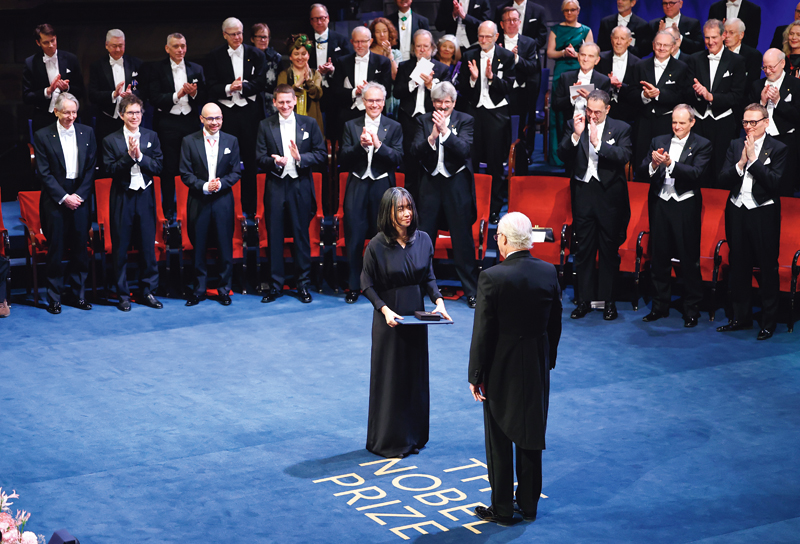
Novelist Han Kang, recipient of last year’s Nobel Prize in Literature, accepts the medal and diploma from King Carl XVI Gustaf of Sweden during the award ceremony held at the Stockholm Concert Hall on December 10, 2024. Han is renowned for depicting the struggles and dignity of humans in the face of tragedy through elegant, poetic prose.
© Yonhap News Agency
Koreans have long hoped that a Korean writer would win the Nobel Prize, which could be interpreted as an extension of their educational zeal and strong drive for accomplishment. The Nobel Prizes for peace and literature, arguably the most recognized, were especially coveted. After then President Kim Dae-jung received the Nobel Peace Prize in 2000, attention shifted to attaining the Literature Prize.
Expectations were heightened when Japanese writers Yasunari Kawabata and Kenzaburō Ōe were awarded the Literature Prize in 1968 and 1994, respectively, and Chinese writer Mo Yan in 2012. Encouraged by the literary accomplishments of authors in neighboring countries, Koreans felt that the Nobel Prize was almost within reach.
Against this backdrop, the Daesan Foundation, a private organization, and the government-run Literature Translation Institute of Korea began providing grants for the translation and publication of Korean literature with the aim of propelling it onto the international stage and hopes of clinching the Nobel Prize, which would be the highest global recognition. The cherished dream was fulfilled in 2024 when the Swedish Academy (Svenska Akademien) announced Han Kang as the recipient of the Nobel Prize in Literature, making her the first Asian woman to receive the award.
HISTORICAL TRAUMA
At home, people were elated and expressed their happiness in being able to read a Nobel Prize-winning novel in its original language. At the time of her Nobel Prize announcement, Han’s works had been translated and published in 82 editions across 28 languages. Han declined a big celebration, her father explaining that she felt it was inappropriate with wars still continuing in the world.
Han debuted as a poet in 1993, when she graduated from Yonsei University’s Korean Literature Department. The next year, she won the Spring Literary Contest sponsored by Seoul Shinmun, Korea’s oldest running newspaper, for her short story Red Anchor (Bulgeun dat). Highly regarded for her weighty themes that pose questions about the human capacity for both violence and dignity, she went on to receive many prestigious literary awards in Korea.
The Swedish Academy cited Han for her “intense poetic prose that confronts historical traumas and exposes the fragility of human life.” In Han’s bio-bibliography detailing her oeuvre, the Academy further elaborated: “Han Kang’s work is characterized by this double exposure of pain, a correspondence between mental and physical torment with close connections to Eastern thinking. In her oeuvre, Han Kang confronts historical traumas and invisible sets of rules and, in each of her works, exposes the fragility of human life. She has a unique awareness of the connections between body and soul, the living and the dead, and in her poetic and experimental style has become an innovator in contemporary prose.”
The struggle with historical trauma is a recurrent theme characterizing Han’s work. Her novels Human Acts (Sonyeoni onda, 2014) and We Do Not Part (Jakbyeolhaji anneunda, 2021) deal with some of the most tragic events in modern Korean history — the violent suppression of the May 18 Gwangju Uprising in 1980 and the April 3 Jeju Uprising in 1948, respectively — capturing the brutality and wounds inflicted on individuals by these historical atrocities through her poetic prose.
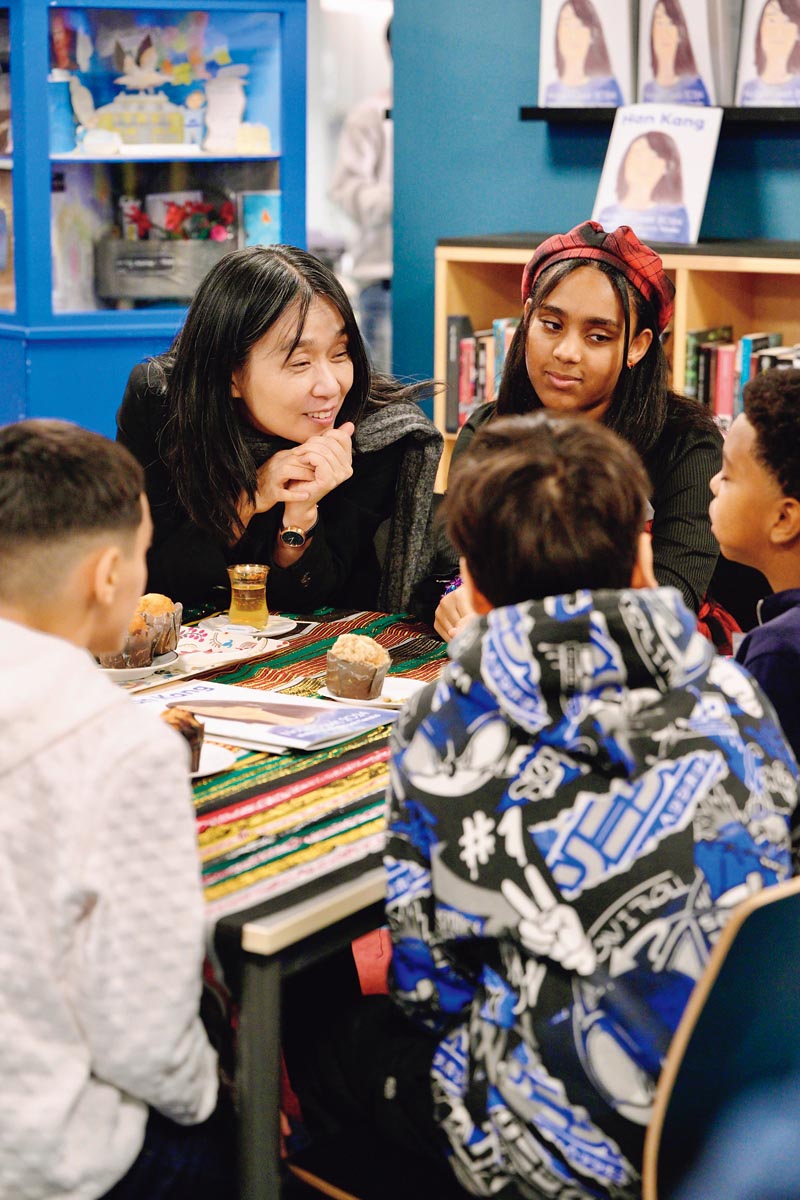
As part of the Nobel Prize Outreach event, Han spends time with young students at a multicultural school in Rinkeby on the outskirts of Stockholm.
© Nobel Prize Outreach, Photography by Nanaka Adachi
Han’s early works largely dealt with personal grief and existential pain. In her breakout novel The Vegetarian (Chaesikjuuija), published in 2007, she made a bold literary turn, delving into the oppression and violence society imposes on individuals through the themes of patriarchy and the meat-eating culture. Han portrays the essence and perils of violence through the story of Yeong-hye, who refuses to eat meat one day. The ensuing violence inflicted by her husband, father, and her sister’s husband is implicit and explicit. Unrelenting, Yeong-hye continues to reject meat and dreams of turning into a plant as a way of escape. The novel’s English-language edition, translated by Deborah Smith, won the prestigious Man Booker International Prize in 2016, catapulting Han to global fame.
The White Book, the English translation of Huin, was shortlisted for the same prize in 2018, and five years later, Impossibles adieux, the French translation of We Do Not Part, won the Prix Médicis Étranger, a French literary prize for foreign literature. Both these awards raised Han’s prospects for the Nobel Prize.
FUNDAMENTAL QUESTIONS
Han’s thematic journey has evolved from personal grief to social oppression, and further expanded to historical trauma. There is one anecdote worth noting in regard to this. After Han’s Nobel Prize announcement, Jeong Gwa-ri, literary critic and professor emeritus at Yonsei University, said in an interview that in 2010, when Han was a graduate student, she told him, “I plan to do documentary from now on.”
Han subsequently wrote Human Acts and We Do Not Part. While the two novels are inspired by two massacres in modern Korean history, they are obviously not renderings of historical facts but literary works infused with fictional elements and imagery. However, it could be said that underlying the literary sublimation of true events is the intention to remember and mourn, albeit belatedly.
Human Acts revolves around Dong-ho, a fifteen-year-old boy, his friend Jeong-dae, and his older sister Jeong-mi, who were killed by martial law forces during the Gwangju Uprising in May 1980. The story is narrated by the acquaintances of Dong-ho and Jeong-dae who survived the civilian massacre. They recall the events that unfolded and the aftermath, which shows that Han intended the novel to serve primarily as a medium of remembrance and mourning. This is poetically encapsulated in the novel’s famous sentence, “After you died I could not hold a funeral, and so my life became a funeral.”
The first-person pronoun used here refers to Eun-sook, who worked with Dong-ho at the provincial office collecting dead bodies, but in essence, it also refers to the survivors of the violent suppression, and more broadly, to the readers of the book, both at home and abroad. Turkish and Arab readers who, like Koreans, have experienced military coups and political violence, commented that they felt the novel was telling their story.
While Human Acts delves into the universal themes of violence, resistance, sacrifice, and remembrance, it poses more fundamental questions that elevate the novel’s value and meaning: “What is humanity? What do we have to do to keep humanity as one thing and not another?” These are universal questions sparked by Korea’s collective historical trauma of the brutal oppression of the Gwangju Uprising and cuts across similar atrocities in human history, such as the Spanish Civil War, the Holocaust committed by Nazi Germany, and the Bosnian Genocide. Han said of Human Acts that it is a “novel of questions,” which takes readers on a journey to find their own answers.
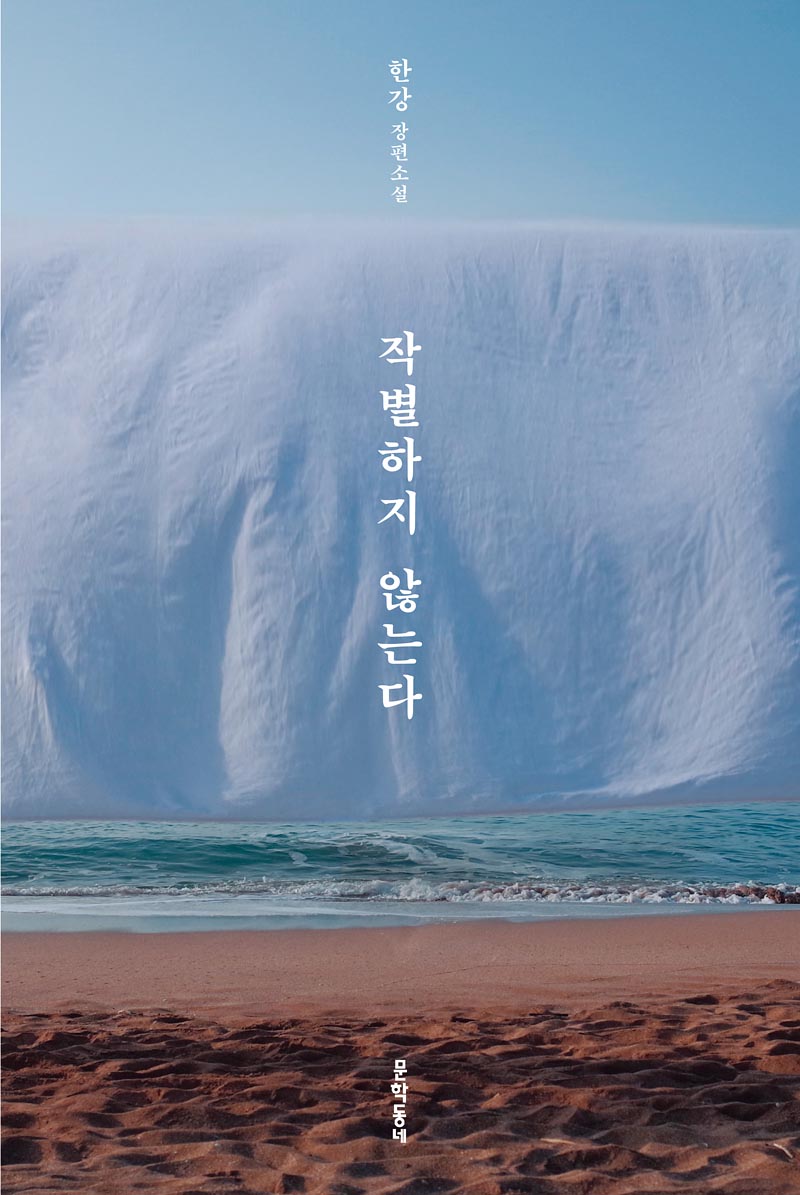
Cover of the novel We Do Not Part, published by Munhakdongne in 2021. It won the Prix Médicis Étranger, a French literary prize for foreign literature, in 2023.
Courtesy of Munhakdongne
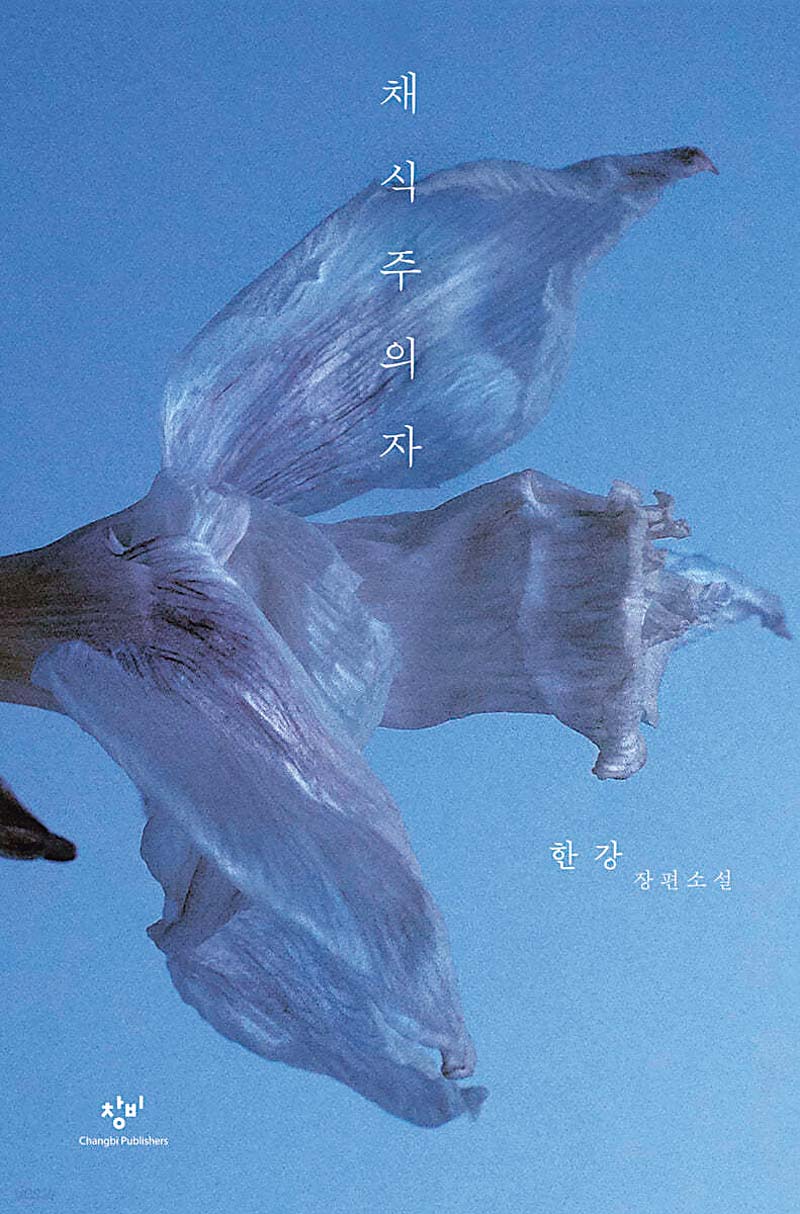
The Vegetarian won the Man Booker International Prize in 2016, elevating the global presence of Korean literature. The novel was reissued by Changbi Publishers in 2024 with a new cover design.
Courtesy of Changbi Publishers
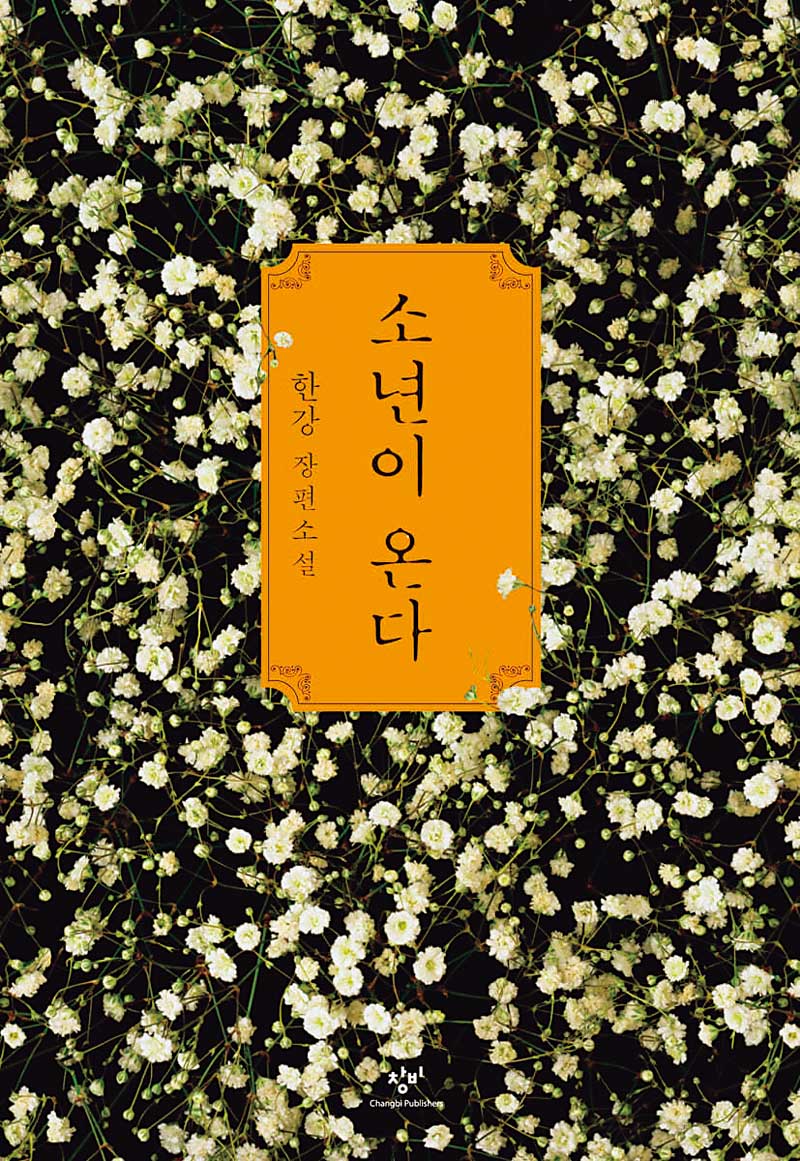
The 2014 novel Human Acts has been translated and published in over twenty countries. In 2017, it won the Premio Malaparte (Malaparte Prize), an Italian literary award given to an international writer.
Courtesy of Changbi Publishers
EMPATHY FOR SUFFERING
We Do Not Part deals with the tragic consequences of the military and police massacre of civilians on Jeju Island in 1948. In the early part, the novel depicts the personal torment of novelist Kyung-ha after publishing a book about the massacre. It begins with the friendship
between Kyung-ha and visual artist In-seon, before shifting focus to the struggles of In-seon’s mother, Kang Jeong-sim, who spent her whole life searching for her older brother, who was arrested during the Jeju Uprising and went missing. As the story progresses, readers witness her evolution from a fragile woman to a strong individual as an agent of history.
Along with these three novels, Greek Lessons (Huirabeo sigan, 2011) has also been published in many countries. It features a woman who has lost the ability to speak due to personal loss and a man who is slowly losing his eyesight. Recognizing each other’s vulnerabilities, they develop a bond which deepens as they find solace and strength in one another. The novel explores the theme of empathizing with other people’s pain and taking action, which courses throughout Han’s oeuvre.